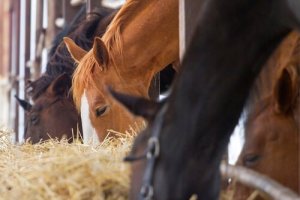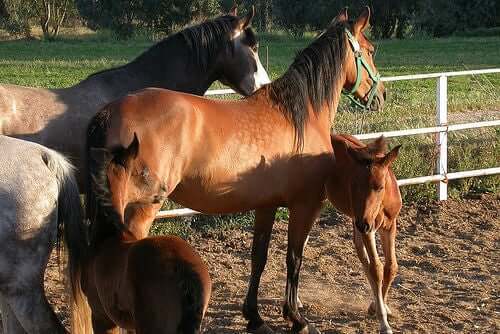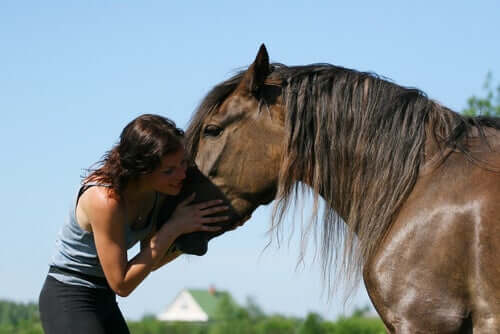What Should You Feed Your Horse?


Written and verified by the lawyer Francisco María García
When you feed your horse, you need to ensure that they get all the necessary nutrients to develop as best they can. It’s a very important part of keeping your horse healthy.
More than just a business
Horses are much more than a financial investment. It’s recognized that they can be very useful for children’s physical and intellectual development, as well as aiding people to recover from motor problems and nerve damage.
However, as with any animal, they’re only able to perform when they’re healthy. This means feeding your horse is a vital part of being able to enjoy their company, as well as providing activities to do together.

How to recognize a healthy, well-fed horse?
A healthy horse can be seen in its key features: a shiny, sleek coat with a long, remarkable mane, tall strong legs, and a robust body with well-developed muscles.
They’re sociable animals and need a name, and they’re also curious, despite being cautious when dealing with unknown places, people, or animals. Their senses are sharpened and they’re very attentive to what’s going on around them. They have excellent hearing and their ears will move to focus on any sound that intrigues them.
Unfortunately, it’s still possible to see horses in poor conditions due to neglect, abuse or exploitation. Very thin, frightened horses with dull hair tend to show signs of nutritional deficiencies.
Presently, it’s possible to file an anonymous report, and anyone who physically or emotionally abuses an animal can be prosecuted.
What to feed your horse?
“We are what we eat.” This golden rule works for horses too.
Every species of animal has its own nutritional needs and requires a specific diet. It’s all about supplying your body with the correct nutrients to keep it healthy.
However, choosing a diet for your horse can be more complicated than it seems. There are many different products available on the market, and price or brand name is not always a guarantee of quality. You also need to consider the proportions of different nutrients, and this changes depending on the individual animal.
As a result, it’s always a good idea to seek professional help and regularly consult your vet, especially before making any radical changes to your horse’s diet.
Four key tips for success in feeding your horse
1. Hydration first
Mammals need to stay hydrated to stay healthy. An adult horse will normally drink between 4.5 and 9 gallons of water per day. In summer, when the temperatures rise considerably out in the fields, this can reach 16 gallons.
This is why it’s very important to make sure your horse always has fresh, clean water available. Keep their water out of the sun so that it stays cool.
2. Structural carbohydrates
Structural carbohydrates are a horse’s main energy source. Since they’re grazing animals, their digestive system needs a lot of these to function correctly.
A horse raised in the field will usually graze for about 12 hours a day. This means that they can consume between 13 and 19 lb of grass and hay each day. You also need to make sure that your horse has enough fodder to compensate for the reduction in natural grazing.
You should offer your horse about 1 to 2% of its body weight in hay per day. Be sure to maintain their hay supply in order to prevent the spread of fungi and bacteria.
3. Non-structural carbohydrates
Traditionally, horses have been fed cereals such as oats, corn or barley. But in reality, these non-essential carbohydrates should be given to your horse sparingly. Otherwise, they can cause gas and an upset stomach.

The recommended daily amount of non-structural carbohydrates is between 7 and 9 ounces per 100 lb of body weight.
4. Natural dietary supplements
Your horse’s diet should also be reinforced with fats, proteins, vitamins, and minerals. The best idea is to opt for an enriched horse feed. Your vet will be able to tell you how much to give your horse and help you assess the right food.
Paying close attention to how you feed your horse is an important part of being a responsible owner and enjoying the companionship of a happy, healthy horse.
When you feed your horse, you need to ensure that they get all the necessary nutrients to develop as best they can. It’s a very important part of keeping your horse healthy.
More than just a business
Horses are much more than a financial investment. It’s recognized that they can be very useful for children’s physical and intellectual development, as well as aiding people to recover from motor problems and nerve damage.
However, as with any animal, they’re only able to perform when they’re healthy. This means feeding your horse is a vital part of being able to enjoy their company, as well as providing activities to do together.

How to recognize a healthy, well-fed horse?
A healthy horse can be seen in its key features: a shiny, sleek coat with a long, remarkable mane, tall strong legs, and a robust body with well-developed muscles.
They’re sociable animals and need a name, and they’re also curious, despite being cautious when dealing with unknown places, people, or animals. Their senses are sharpened and they’re very attentive to what’s going on around them. They have excellent hearing and their ears will move to focus on any sound that intrigues them.
Unfortunately, it’s still possible to see horses in poor conditions due to neglect, abuse or exploitation. Very thin, frightened horses with dull hair tend to show signs of nutritional deficiencies.
Presently, it’s possible to file an anonymous report, and anyone who physically or emotionally abuses an animal can be prosecuted.
What to feed your horse?
“We are what we eat.” This golden rule works for horses too.
Every species of animal has its own nutritional needs and requires a specific diet. It’s all about supplying your body with the correct nutrients to keep it healthy.
However, choosing a diet for your horse can be more complicated than it seems. There are many different products available on the market, and price or brand name is not always a guarantee of quality. You also need to consider the proportions of different nutrients, and this changes depending on the individual animal.
As a result, it’s always a good idea to seek professional help and regularly consult your vet, especially before making any radical changes to your horse’s diet.
Four key tips for success in feeding your horse
1. Hydration first
Mammals need to stay hydrated to stay healthy. An adult horse will normally drink between 4.5 and 9 gallons of water per day. In summer, when the temperatures rise considerably out in the fields, this can reach 16 gallons.
This is why it’s very important to make sure your horse always has fresh, clean water available. Keep their water out of the sun so that it stays cool.
2. Structural carbohydrates
Structural carbohydrates are a horse’s main energy source. Since they’re grazing animals, their digestive system needs a lot of these to function correctly.
A horse raised in the field will usually graze for about 12 hours a day. This means that they can consume between 13 and 19 lb of grass and hay each day. You also need to make sure that your horse has enough fodder to compensate for the reduction in natural grazing.
You should offer your horse about 1 to 2% of its body weight in hay per day. Be sure to maintain their hay supply in order to prevent the spread of fungi and bacteria.
3. Non-structural carbohydrates
Traditionally, horses have been fed cereals such as oats, corn or barley. But in reality, these non-essential carbohydrates should be given to your horse sparingly. Otherwise, they can cause gas and an upset stomach.

The recommended daily amount of non-structural carbohydrates is between 7 and 9 ounces per 100 lb of body weight.
4. Natural dietary supplements
Your horse’s diet should also be reinforced with fats, proteins, vitamins, and minerals. The best idea is to opt for an enriched horse feed. Your vet will be able to tell you how much to give your horse and help you assess the right food.
Paying close attention to how you feed your horse is an important part of being a responsible owner and enjoying the companionship of a happy, healthy horse.
This text is provided for informational purposes only and does not replace consultation with a professional. If in doubt, consult your specialist.








